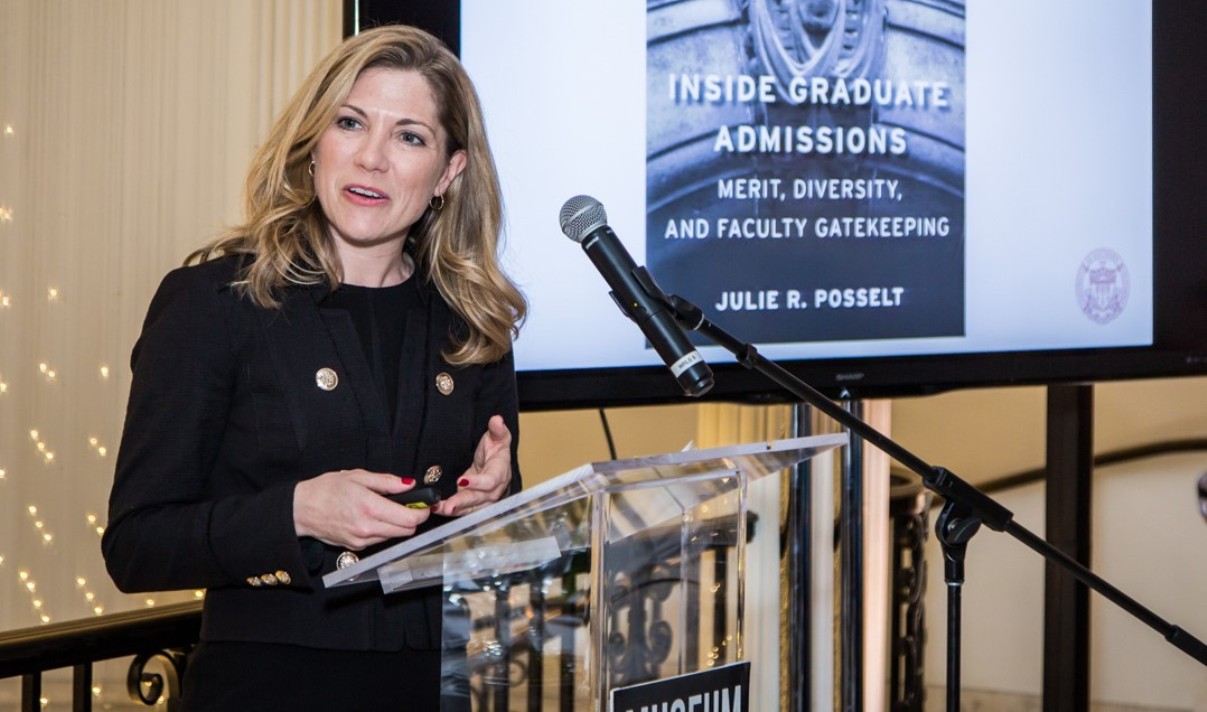
Julie Posselt: System Shocks and Institutional Change
Change comes slowly in higher education, or so the best theory and evidence say. Yet there are exceptions to every rule, and exogenous shocks such as protests, wars, natural disasters and, as we are now seeing, a global pandemic can compel decisive, transformational changes that colleges, universities, and their members would otherwise resist.
Will disruptions and uncertainties of COVID-19 catalyze paradigm shifts or simply affect current cohorts moving through the system? We will all have to stay tuned to observe the ripple effects of this crisis, but in some respects, the shape of the splash is up to us.
Will we grow comfortable enough with changes to our routines that our default priorities shift? What messages are we communicating to those in our spheres of influence? What principles do we protect in making tough decisions, and which do we let slide?
Questions like these are the stuff of culture, and anthropologists know that if you want to deeply understand some culture, a few things are especially revealing: how people are socialized to the culture, and how the people who do the socializing set and act on priorities — both on a daily basis and especially in times of crisis. To understand cultures within the academy today and what they are becoming, it is instructive to look closely at graduate education and the mindsets of faculty who teach our students.
My research team is therefore helping identify and address root causes of institutionalized inequities through two research-practice partnerships funded by the National Science Foundation: the Inclusive Graduate Education Network (IGEN), whose Research Hub is centered in the Pullias Center, and the California Consortium for Inclusive Doctoral Education (C-CIDE). Leaders of the constituent academic departments, PhD programs, and disciplinary societies have committed to building diversity where there has been homogeneity, reducing inequities where gaps have been stubborn, and creating more humane and inclusive environments.
These partnerships treat standard practices in higher education like admissions, hiring, teaching, and mentoring as areas for systematic improvement, because embedded biases in everyday priorities and routines aggregate over time to produce standard practices through which patterns of inequity are reproduced. Shift habits and routines, and you begin to shift the default.
In these spaces, which are somewhere between the central tendencies of what the academy has been and glimmers of what it might become, we see barriers and possibilities, cautionary tales and inspirational examples. We see learning and hard work in progress. The work will always be unfinished, in part because change agents themselves are products of the communities they are trying to change, just as scholars are part of the realities they try to understand. But the same commitments that drew people to participate in organized efforts to improve standard practices are powerful assets for leadership during difficult times as these.
And what is more, my research finds that it doesn’t take a pandemic to catalyze the sort of chain reaction that produces positive organizational change. Rather, an argument in my forthcoming book Equity in Science: Representation, Culture, and the Dynamics of Change in Graduate Education is that institutional change comes about through change on multiple scales–through a combination of macro-level disruptive shocks, incremental meso-level policy maneuvers that change the game for everyone, and quantum scale micro-events by individuals and within one-to-one interactions that have surprisingly powerful ripple effects over time.
Critical to quantum change for equity in the organizations and people where I observed it was developing a habit of actively accounting for equity, diversity, and/or power in a wide variety of everyday evaluations, decisions, and interactions.
What does it mean to keep equity in mind in the middle of a pandemic? When so much of our time is spoken for, and when so much is competing for our attention, equity may seem more of a challenge than ever. Here are three simple check-in’s to consider:
- Check in with yourself: Before rendering a judgment or making a decision, build a habit of pausing to consider how the outcomes may produce disparate impacts and/or empower otherwise marginalized groups.
- Check in with your strategy: If a necessary action might compromise equity, what 1-3 additional steps might you take to reduce costs for the vulnerable?
- Check in with your people: What colleague or student could use a quick note? Whose perspective would help you act more wisely during this time?
Crises have a way of revealing our character and the arbitrariness of our previous priorities. And COVID-19 is obliging us to– at least for a while– live different lives. It is too soon to say what the higher education priorities are that we will want to rethink when we gratefully find ourselves on the other side, but it is not too soon to begin building habits of mind and of human connection that will ensure that the next chapter of higher education is more humane and just.